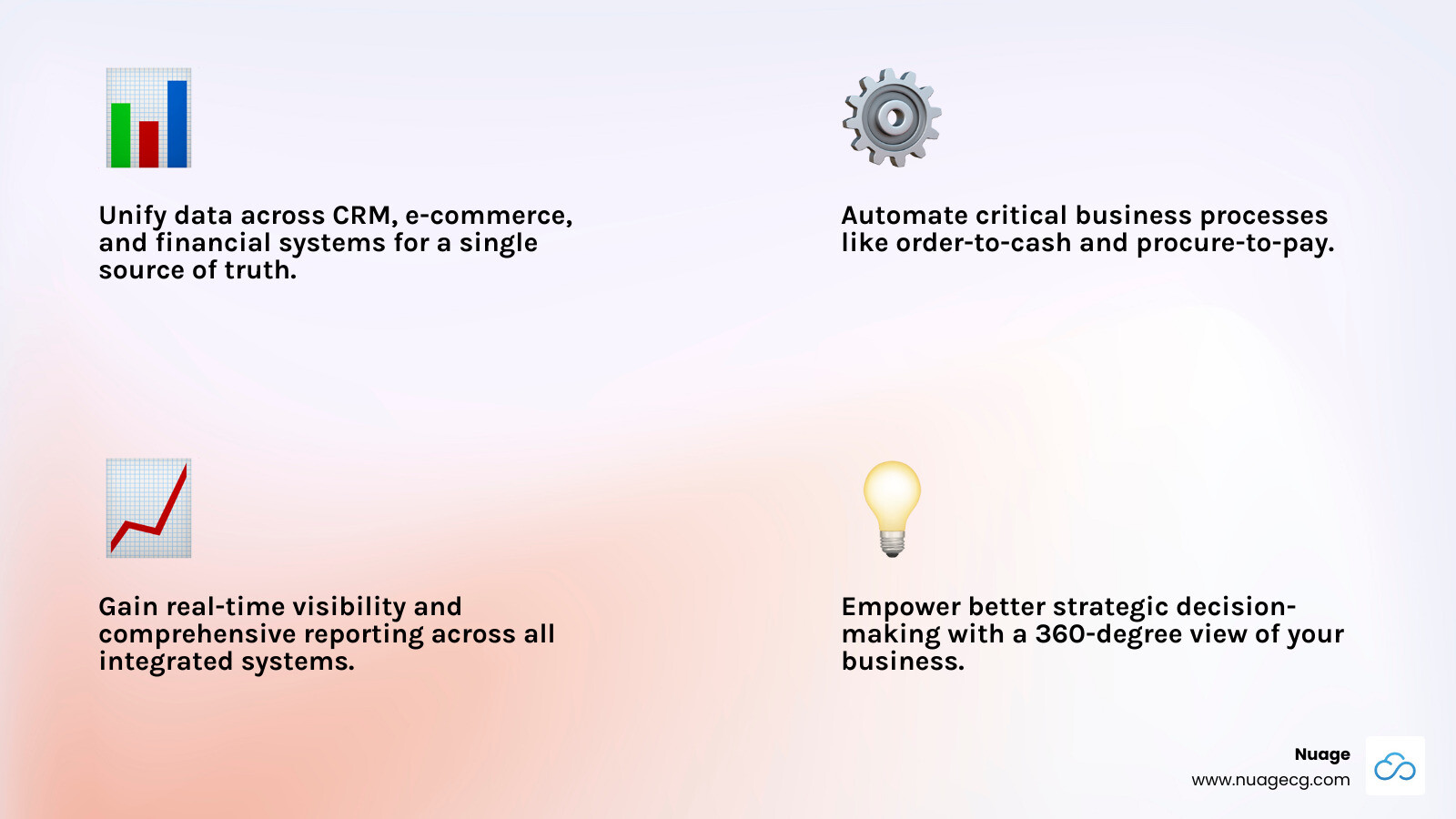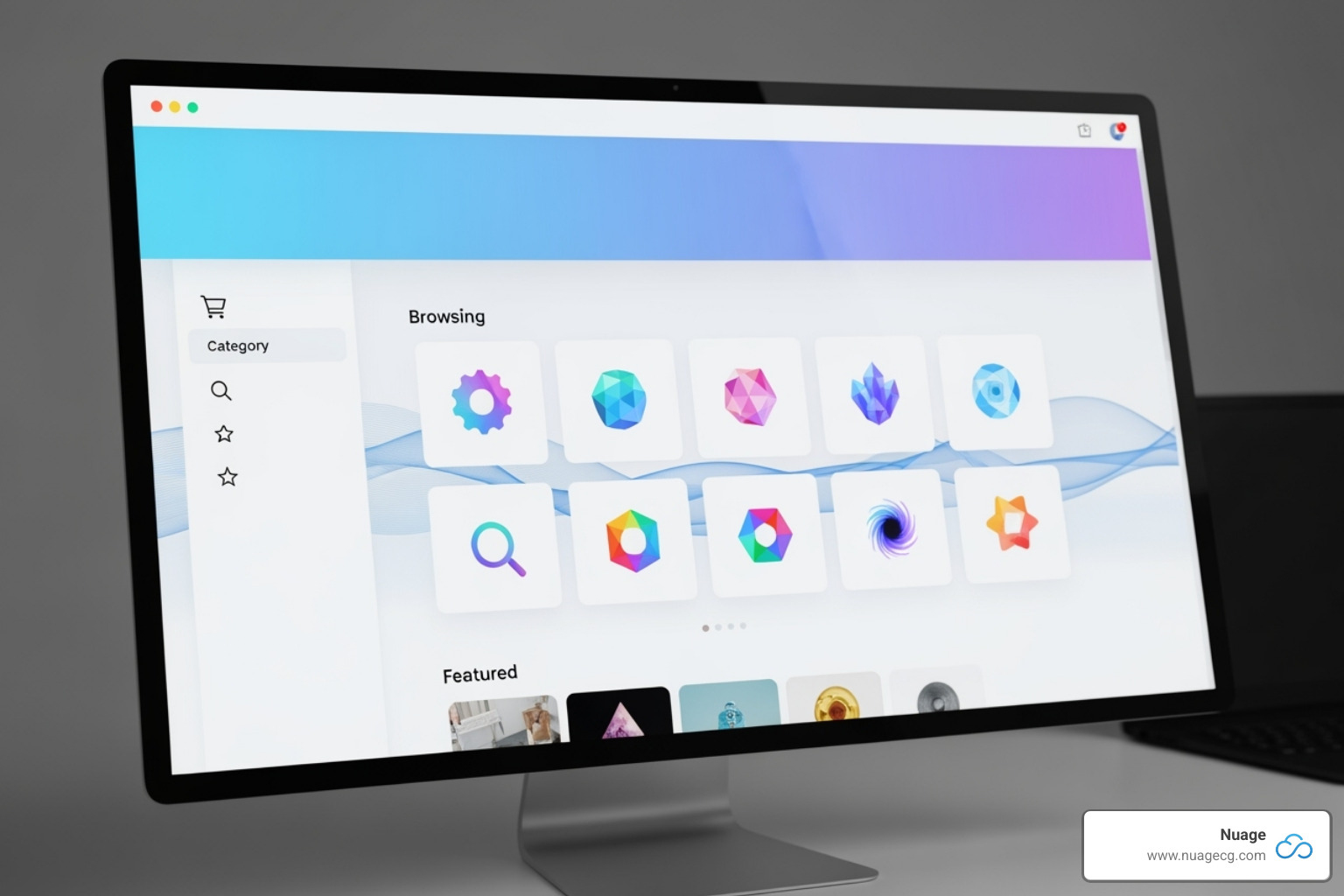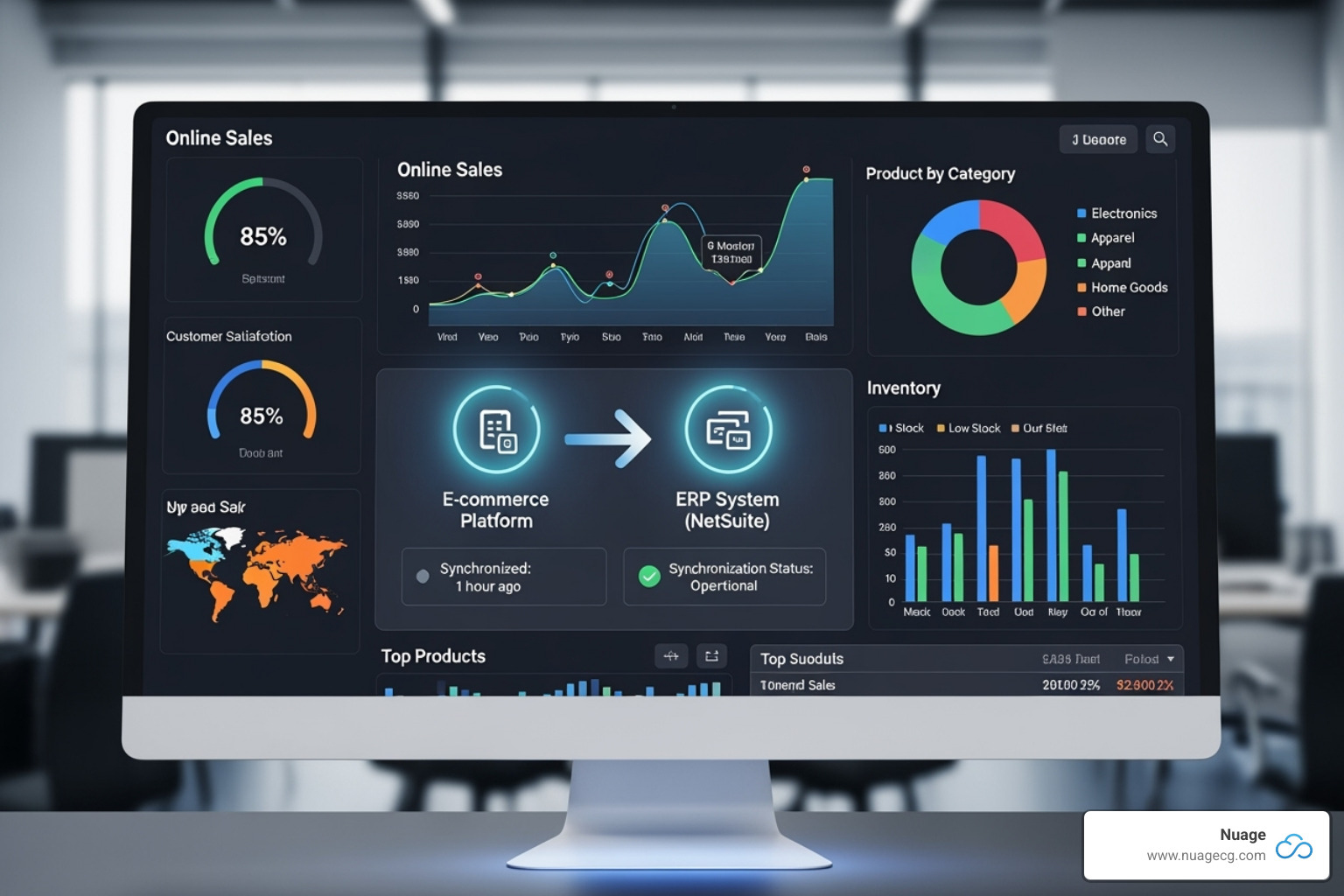Why NetSuite Integrations Are Critical for Business Success

NetSuite integrations connect your ERP system with other business applications, creating a unified ecosystem that eliminates data silos and automates workflows across your entire organization.
Key NetSuite Integration Methods:
- SuiteTalk (SOAP/REST) – Native APIs for custom connections
- RESTlets – Custom web services using SuiteScript
- NetSuite Connector – Pre-built integrations for e-commerce and logistics
- SuiteApps – Marketplace applications that extend functionality
- iPaaS Platforms – Third-party integration services
Top Integration Benefits:
- Eliminate manual data entry and reduce errors
- Automate business processes from order-to-cash
- Get real-time visibility across all systems
- Scale operations without adding complexity
Modern businesses face a critical challenge: valuable data trapped in separate systems. Customer information lives in a CRM, inventory data in a warehouse management system, and financial records in accounting software. This creates inefficiencies, errors, and blind spots that prevent informed decision-making.
Research shows that well-integrated NetSuite systems deliver 40% higher operational efficiency and reduce operational costs by 23% compared to businesses with disconnected systems. Integrated solutions also lead to 50% faster financial close times and dramatically improved customer response rates.
The solution is connecting your NetSuite ERP with your other business applications. Whether you’re syncing e-commerce orders, automating financial reporting, or streamlining supply chain operations, the right integrations transform disconnected tools into a powerful, unified business platform.

Netsuite integrations vocab to learn:
Why Connecting Your Systems with NetSuite is a Game-Changer
Disconnected systems create inefficiencies, from sales and warehouse disconnects to finance teams spending days manually compiling reports. NetSuite integrations solve this by creating a unified business ecosystem where every part of your organization works together seamlessly.
Think of it as moving from multiple, separate conversations to a single, unified one. Your sales data informs your inventory system, your customer service team sees order history instantly, and your financial reports pull real-time data from every corner of the business.
Companies with well-integrated systems see 40% higher operational efficiency and reduce costs by 23%. The true value is in the day-to-day operations: fewer errors, faster responses, and happier customers. When your NetSuite ERP becomes the central hub for all your applications, you gain a single source of truth that everyone can trust.
Breaking Down Data Silos
Data silos emerge as you add new systems, trapping customer data in your CRM, inventory numbers in your warehouse system, and financials in your accounting software. The problem isn’t having different systems; it’s that they don’t communicate, forcing your team into manual data entry and risking errors.
NetSuite integrations create direct connections, automating data flow. When your e-commerce platform talks to NetSuite, orders flow automatically. When your CRM syncs with your ERP, sales teams see real-time inventory. This creates centralized data and cross-departmental visibility, giving everyone the complete picture they need to do their best work.
Automating Key Business Processes
Manual processes kill productivity. NetSuite integrations turn these manual tasks into smooth, automated workflows. An online order can automatically create a sales order in NetSuite, update inventory, trigger fulfillment, and generate an invoice.
The order-to-cash, procure-to-pay, and lead-to-cash cycles become faster and more accurate. This automation reduces manual tasks and errors, leading to faster cycle times. Your team is freed up to focus on strategic, high-value work that moves the business forward.
Gaining a Unified View for Better Decision-Making
Operating with partial information is risky. When systems are separate, you might have great sales data but no visibility into inventory, or financial reports that don’t reflect real-time operational changes.
NetSuite integrations provide a complete picture by bringing all your data into one place. You get a 360-degree customer view, comprehensive financial reporting, proactive inventory management, and end-to-end supply chain visibility. This unified view enables strategic planning based on facts, not guesses, allowing you to identify trends, forecast accurately, and make confident decisions.
A Guide to NetSuite Integration Methods
Connecting NetSuite with other systems offers several paths. The best method depends on your specific needs, technical resources, and timeline. Sometimes a simple, pre-built solution is perfect; other times, you need the flexibility of custom development.
Here’s how the main integration methods stack up:
| Method | Use Case | Technical Skill Required | Cost (Implementation) | Speed (Go-Live) |
|---|---|---|---|---|
| SuiteTalk (SOAP/REST) | Complex, high-volume data, custom applications | High (Developer) | Higher | Weeks to Months |
| RESTlets | Custom, lightweight web services, specific endpoints | High (SuiteScript Dev) | Moderate to High | Weeks |
| NetSuite Connector | Pre-built integrations for e-commerce, POS, 3PL | Low to Moderate | Moderate | Days to Weeks |
| SuiteApps | Extend NetSuite functionality, industry-specific solutions | Low to Moderate | Low to Moderate | Minutes to Days |
| iPaaS Platforms | Managing multiple complex integrations, visual builders | Moderate (Integration Specialist) | Moderate to High | Weeks to Months |
Native NetSuite Tools for Direct Connection
NetSuite’s SuiteCloud Platform provides the tools to build secure, reliable connections. It features token-based authentication and OAuth 2.0 for security, supporting both modern REST APIs and traditional SOAP web services. This flexibility allows you to connect to both new cloud applications and older on-premises systems.
SuiteTalk (SOAP & REST Web Services)
SuiteTalk is NetSuite’s primary API. SOAP web services are the workhorse for large, complex data transfers, ensuring data integrity. REST web services are a modern, streamlined option using JSON, ideal for real-time lookups and lightweight communication. Both provide full CRUD (Create, Read, Update, Delete) operations for complete data control.
RESTlets
RESTlets allow you to create custom, lightweight API endpoints using SuiteScript. They are perfect for exposing data in a specific format or building a simple endpoint for a mobile app to check order status. They provide precision control for unique integration needs. For technical details, see NetSuite’s RESTlets documentation.
NetSuite Connector
For common integration scenarios, NetSuite Connector offers pre-built, out-of-the-box solutions. It focuses on connecting e-commerce platforms, point-of-sale systems, and 3PLs. This approach accelerates implementation from months to days, with pre-configured data maps and built-in error handling. It automates bi-directional data sync, such as orders flowing into NetSuite and inventory levels syncing back to your store. Check out this overview: What is NetSuite Connector? (Video).
Pre-built Solutions: SuiteApps

The SuiteApps Marketplace is an app store for NetSuite, offering ready-made applications that extend NetSuite’s core functionality. Because they are built specifically for the platform, they are deeply integrated, often sharing the same database. SuiteApps cover everything from industry-specific needs to functional extensions, and implementation is typically a simple installation and configuration process.
Integration Platforms for NetSuite
An Integration Platform as a Service (iPaaS) acts as a command center for managing multiple, complex integrations. These platforms are middleware that sits between NetSuite and your other systems, handling data routing, change, and error management, often with visual workflow builders. iPaaS is ideal for businesses that need to manage numerous connections, providing robust monitoring, error handling, and scalability as your business grows.
Popular NetSuite Integrations by Business Function
Strategic NetSuite integrations connect NetSuite to specialized applications that make each department more effective. The most common integrations are for e-commerce, customer relationship management (CRM), logistics and supply chain, finance, and human resources. When these integrations work together, an e-commerce order can automatically flow into NetSuite, update inventory, trigger shipping, update the customer’s CRM record, and create financial entries—all without manual intervention.
Key Use Cases for NetSuite Integrations in E-commerce
For online sellers, integrating an e-commerce platform with NetSuite transforms operational chaos into a well-oiled machine. NetSuite integrations automate the entire process from the moment a customer clicks “buy.”

Core e-commerce integrations focus on order management, inventory synchronization, customer data flows, and product information management. This ensures orders are processed instantly, stock levels are always accurate, customer service has a complete history, and product details are consistent everywhere.
E-commerce Platforms
Integrations with platforms like Shopify, WooCommerce, Amazon, and Magento (Adobe Commerce) make complex processes effortless. They intelligently map customer data, apply tax rules, check inventory, and trigger fulfillment. This automation leads to faster shipping, prevents stockouts, and enables personalized service, turning your online store into a fully integrated sales channel. Learn more about NetSuite E-commerce Integrations.
Connecting CRM for a Complete Customer View
Integrating your CRM and NetSuite provides a unified system for all customer interactions. This enables powerful automation across the customer lifecycle, from sales and marketing to customer support.
Lead management becomes seamless as prospects in your CRM are automatically created in NetSuite. Opportunity tracking keeps sales and finance aligned, while quote-to-cash processes reflect real-time pricing and inventory from NetSuite. Your customer support team gains a complete view of every customer, including past orders, payment history, and support tickets, all from their familiar CRM interface.
Salesforce CRM
Salesforce and NetSuite integrations offer sophisticated bi-directional data sync, ensuring customer information is always current in both systems. Sales pipeline visibility is improved, as reps can see NetSuite data within Salesforce. You can also achieve accurate marketing ROI tracking by connecting campaign data to actual revenue in NetSuite. Similar benefits are available with other CRMs like HubSpot and Freshdesk. Connect your business with Salesforce Stratus to experience unified customer management.
Streamlining Logistics and Supply Chain
Logistics and supply chain management involve immense complexity. NetSuite integrations bring order by connecting your ERP with specialized logistics tools.
Shipping automation eliminates manual data entry into carrier websites. Warehouse management system (WMS) integration ensures accurate pick lists and inventory counts. Connections to third-party logistics (3PL) providers automate order transmission and tracking updates. This leads to dramatic improvements in inventory control, preventing stockouts and overstock situations. Real-time tracking information flows from carriers to customers, building confidence in your brand.
Shipping and Fulfillment Solutions
Modern shipping integrations optimize your entire fulfillment process. Rate shopping automatically compares carrier options to find the best price and service. Label printing is built directly into your NetSuite workflow. Shipment tracking and proof of delivery information flow back into NetSuite automatically. This streamlined fulfillment process means faster order processing, fewer errors, and satisfied customers. Learn more about NetSuite Logistics Integrations.
Strategy and Best Practices for Success
Successful NetSuite integrations are achievable with the right strategy. Most challenges are preventable by planning for them before they derail your project.
Common Challenges and How to Overcome Them
- Data Quality Issues: Dirty data is a primary cause of integration failure. Cleanse your data and establish clear standards before you begin.
- Poor Documentation: A lack of documentation for systems, APIs, and processes makes integration painful. Insist on comprehensive documentation and create detailed data mapping guides.
- Scope Creep: Define your scope clearly from day one and stick to it. Start with a core integration and build from there in later phases.
- Lack of In-house Expertise: Not every business has API developers on staff. Partnering with an experienced firm provides the necessary expertise without needing to hire internally.
- API Limitations: A third-party system’s API may not expose all the data you need. Investigate API capabilities thoroughly during the planning phase.
- Conflicting Customizations: Existing customizations can interfere with new integrations. Perform a comprehensive review of your current setup to identify potential conflicts early.
Choosing the Right Method for Your NetSuite Integrations
Selecting the right integration approach is critical. Consider these factors:
- Business Needs: Assess the urgency, complexity, and volume of your data exchange.
- Technical Resources: Honestly evaluate your team’s technical skills. A pre-built solution may be better if you lack dedicated developers.
- Budget and Timeline: Pre-built connectors and SuiteApps are often faster and more cost-effective. Custom development offers flexibility but requires a larger investment.
- Scalability: Choose a method that can handle future growth in data volume and connections.
- Future-Proofing: Opt for well-supported methods using modern standards like REST APIs to ensure your solution remains viable long-term.
Best Practices for a Smooth Implementation
- Start with a clear plan: Define your goals, scope, and success metrics upfront.
- Define data ownership: Assign responsibility for data accuracy in each system.
- Test thoroughly: Use a sandbox environment to test all scenarios, including edge cases and errors, before going live.
- Monitor performance: Set up alerts for critical issues and review logs regularly to catch problems early.
- Document everything: Maintain detailed records of your architecture, data maps, and workflows.
- Ensure robust security: Use token-based authentication, OAuth 2.0, and role-based access controls.
- Choose the right partner: An experienced NetSuite partner brings technical expertise and proven methodologies to ensure success.
Frequently Asked Questions about NetSuite Integrations
When exploring NetSuite integrations, most questions revolve around cost, time, and technical capability. Here are the honest answers we provide our clients.
How much do NetSuite integrations cost?
The cost of a NetSuite integration depends entirely on its complexity. The primary factors include:
- Solution Type: A pre-built SuiteApp may have a low monthly fee, while a fully custom integration using SuiteTalk will require a significant development investment.
- Complexity: The number of systems, data fields to map, and custom business logic required will all impact the cost.
- Platform Choice: iPaaS platforms typically involve a subscription fee based on data volume and the number of connections.
- Maintenance: Consider the long-term costs of monitoring, updating, and supporting the integration.
Costs can range from a small fee for a simple app to a substantial investment for a complex, enterprise-grade project. The key is to match the solution to your specific business needs and budget.
How long does an integration project take?
The timeline for an integration project can vary from minutes to months, depending on the approach.
- SuiteApps: Can often be installed and configured in minutes or hours.
- Pre-built Connectors: Typically take days to a few weeks for configuration, data mapping, and testing.
- iPaaS Solutions & Custom Integrations: These more complex projects can take weeks to several months, involving development, extensive testing, and careful deployment.
Key variables that impact the timeline include data quality, system complexity, and the thoroughness of your testing phase.
Does NetSuite have a robust API for custom integrations?
Yes. NetSuite was built with integration in mind and offers a powerful and flexible set of tools for developers.
- SuiteTalk: Provides comprehensive access to NetSuite data via both REST and SOAP web services, allowing developers to perform any action they need.
- RESTlets: Enable the creation of custom web services using SuiteScript. This allows you to build specific endpoints custom to your exact requirements.
- SuiteScript API: This is the foundation that allows developers to automate processes, customize workflows, and build powerful integrations that respond to events within NetSuite.
NetSuite’s API capabilities are among the most robust available, providing the tools needed to solve nearly any integration challenge.
Conclusion: Unify Your Business with Expert Integration
In today’s business world, fragmented systems hold you back. NetSuite integrations are more than a technical upgrade—they are a strategic pathway to operational excellence.
By connecting your NetSuite ERP with your entire business ecosystem, you eliminate data silos, automate critical processes, and gain a unified view of your operations. This leads to faster, data-driven decision-making, reduced costs, and a more agile business that can respond quickly to customer needs.
We’ve explored how integrations streamline everything from order-to-cash to supply chain management. The flexibility of NetSuite’s ecosystem—from native tools like SuiteTalk to pre-built SuiteApps and powerful iPaaS platforms—allows you to create a seamless, interconnected environment custom to your needs.
Maximizing your NetSuite ROI isn’t just about having the software; it’s about opening up its full potential through intelligent integration. That requires a partner with the experience to guide the process.
At Nuage, we’ve spent over 20 years helping businesses steer digital change. As your NetSuite Optimization Engine, we assess your unique needs and implement solutions that solve today’s problems while future-proofing your business for tomorrow. We are problem-solving partners dedicated to making your NetSuite instance the powerful operational backbone that drives your success.
Ready to build a smarter, more efficient future for your business?
Connect your business with Salesforce Stratus or Learn more about NetSuite Integrations to start the conversation.
Last Updated: January 3, 2026
Looking for help optimizing your NetSuite? Contact our team for a free consultation.